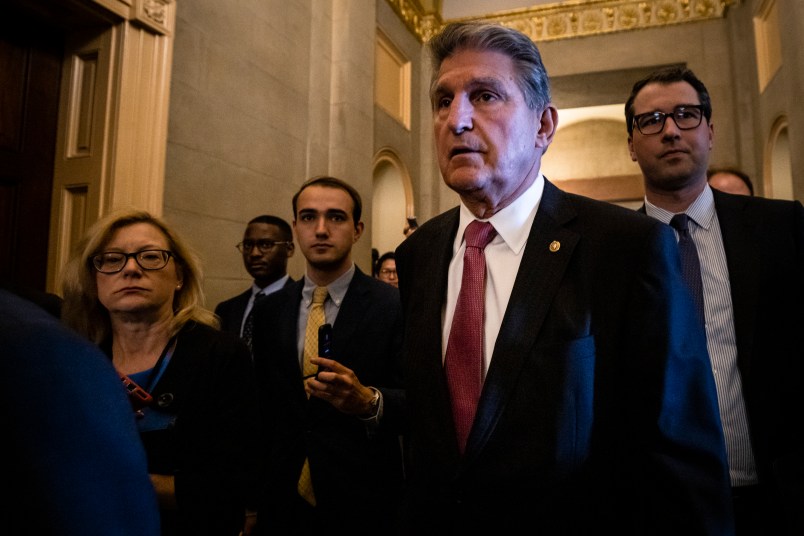Noises are emerging from Capitol Hill that infrastructure talks may be nearing a make-or-break point.
Sens. Joe Manchin (D-WV), John Tester (D-MT), and Mitt Romney (R-UT) all expressed varying degrees of confidence that talks would conclude by Thursday.
While the senators involved in the bipartisan negotiations gave reporters a range of reactions to the ongoing negotiations Wednesday, they had one thing in common: a sense that they only had a day or two to come to an agreement.
“I think we’re looking for a deal today,” Tester said.
“I think we all feel very strongly that we have to have a deal before we leave tomorrow,” said Manchin.
“Inch by inch we’re making progress, and it’s my hope that we can get something done by the end of the day,” Romney said, adding that meetings were continuing after an afternoon vote.
Talks over the bill have dragged on since April, when the Biden administration began to negotiate with Sen. Shelley Moore Capito (R-WV). After those discussions fell through this month, a bipartisan group of ten senators popped up to try to reach a deal. The group has since swelled to 21 lawmakers.
The negotiations drag on as administration officials and progressive groups worry that Republicans are sucking up as much time as possible in the legislative calendar before the 2022 midterm elections. Senate Minority Leader Mitch McConnell (R-KY) described the talks on Wednesday as “constructive,” while noting that “the devil is in the details.”
A White House spokesman did not return TPM’s inquiry about when the Biden administration saw a hard deadline for the talks to end, and White House Press Secretary Jen Psaki declined to offer a specific timeline to reporters at a Wednesday briefing, saying only that “we want to make progress in the next couple of days.”
Senators have noted in recent days that the question of “pay-fors” — how to fund infrastructure spending — has delayed the talks. The GOP has long demanded that the Biden administration describe in detail how it plans to raise money to finance any new spending. When talks began in April, Republicans immediately took tax increases and deficit financing off the table, with Capito proposing that Biden cannibalize the American Rescue Plan to pay for the legislation.
Meanwhile, Democrats are chugging along with the reconciliation bill, reportedly as much as $6 trillion, that will encompass infrastructure priorities cut from the bipartisan deal, as well as various other administration agenda items that have no path to law with the filibuster stymying action in the Senate. The reconciliation package will also give Democrats a chance to raise taxes on corporations and the wealthy, their preferred method to pay for the infrastructure changes that Republicans wouldn’t allow.
The White House has been referring to the work as a “two-track” plan, with bipartisan negotiations continuing as the package that slated to pass via reconciliation is crafted.
An enduring problem with the two-pronged approach is wariness between the two factions of the Democratic party: progressives don’t want to vote for any bipartisan plan that emerges without promises from the more moderate members that they will help pass the reconciliation package too. The reconciliation package is passed on a simple majority, requiring all 50 Democrats to get in line.
When asked by reporters how solid that promise from moderates would have to be to guarantee her vote for a bipartisan bill on Tuesday, Sen. Elizabeth Warren (D-MA) characterized it as “ironclad.” She suggested that she may only be willing to vote on a scaled-down bipartisan package if the vote on the reconciliation bill came first.







Manchin? Joe Manchin? Sinema? Bueller? Anyone?
Warren knows Republicans are playing these centrists. I’m glad she and Sanders are there to hold peoples feet to the fire.
In the movies, the people don’t become aware of infrastructure deficiencies until the dam bursts, the bridge collapses, or they have to spend 3 months drinking cholera water. They don’t even react when the Zombie Apocalypse is underway. The Texas power outage this winter was highly illustrative as people refused to see the systemic failure coming for a decade. So if all we are today is a backward-facing nation and the 21st century is shaping up to be a total write-off, maybe it’s time to get young politicians in there to provide us a positive narrative about the possibilities of the 22nd century.
Somewhat o-t
The same guy who just said ”100% of our focus is on stopping this new administration"?